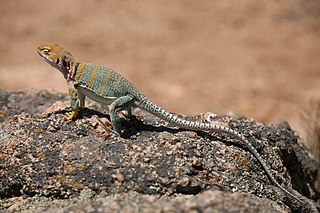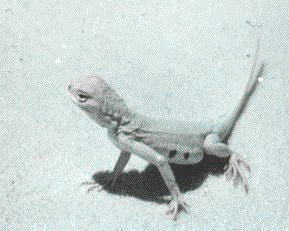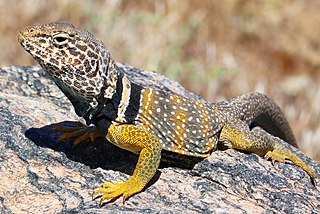
The Crotaphytidae, or collared lizards, are a family of desert-dwelling reptiles native to the Southwestern United States and northern Mexico. Alternatively they are recognized as a subfamily, Crotaphytinae, within the clade Pleurodonta. They are very fast-moving animals, with long limbs and tails; some species are capable of achieving bipedal running at top speed. This species is carnivorous, feeding mainly on insects and smaller lizards. The two genera contain 12 species.

Gambelia is a genus of lizards, commonly known as leopard lizards, within the family Crotaphytidae. Leopard lizards are indigenous to arid environments of southwestern North America.

Crotaphytus is a genus of lizards, commonly known as collared lizards, in the family Crotaphytidae. Member species are small to medium-sized predators indigenous to the American southwest, Baja peninsula, and Mexico. Including the tail, they can be as small as 7 in (18 cm) or as long as 14 in (36 cm), and are characterized by distinct bands of black or brown around the neck, to which their common names refer.

Holbrookia is a genus of earless lizards, known commonly as the lesser earless lizards, in the family Phrynosomatidae. The genus contains six recognized species, which are found throughout the Southwestern and Central United States and northern Mexico. They are characterized by having no external ear openings, presumably to prevent soil from entering their bodies when they are digging.
Edward Harrison Taylor was an American herpetologist from Missouri.

The common collared lizard, also commonly called eastern collared lizard, Oklahoma collared lizard, yellow-headed collared lizard, and collared lizard, is a North American species of lizard in the family Crotaphytidae. The common name "collared lizard" comes from the lizard's distinct coloration, which includes bands of black around the neck and shoulders that look like a collar. Males can be very colorful, with blue green bodies, yellow stripes on the tail and back, and yellow orange throats. There are five recognized subspecies.

Gambelia sila, commonly known as the blunt-nosed leopard lizard, is a species of lizard in the family Crotaphytidae. The species is endemic to southern California.

Sceloporus poinsettii, the crevice spiny lizard, is a species of small, phrynosomatid lizard.

The Great Basin collared lizard, also known commonly as the desert collared lizard or the Mojave black-collared lizard, is a species of lizard in the family Crotaphytidae. The species is endemic to the Western United States.

The Baja California leopard lizard, also known commonly as Cope's leopard lizard, is a species of lizard in the family Crotaphytidae. The species is endemic to Baja California and adjacent southern California.

The Baja California collared lizard or Baja black-collared lizard is a species of lizard in the family Crotaphytidae. The species is endemic to southern California and Baja California (Mexico).

Crotaphytus reticulatus, commonly called the reticulate collared lizard, is a species of moderately sized lizard in the family Crotaphytidae. The species is native to semiarid, rocky regions of the Tamaulipan mezquital. Its range includes the US state of Texas and the Mexican states of Coahuila, Nuevo León, and Tamaulipas. Of all the species in the family Crotaphytidae, C. reticulatus is the only species which is not restricted to rocky habitats.

The long-nosed leopard lizard is a species of relatively large North American lizard in the family Crotaphytidae. Gambelia wislizenii ranges in snout-to-vent length (SVL) from 8.3 to 14.6 cm. It has a large head, a long nose, and a long round tail that can be longer than its body. It is closely related to the blunt-nosed leopard lizard, which closely resembles the long-nosed leopard lizard in body proportions, but has a conspicuously blunt snout. The species G. wislizenii, once considered part of the genus Crotaphytus, is under moderate pressure because of habitat destruction but is categorized as "least concern".

The Sonoran collared lizard is a species of lizard in the family Crotaphytidae. The species is endemic to the U.S. state of Arizona and the Mexican state of Sonora.
Grimser's collared lizard, also known commonly as the Sierra los Cucapas collared lizard and el cachorón de Sierra de los Cucapas in Mexican Spanish, is a species of lizard in the family Iguanidae. The species is endemic to Baja California, Mexico.
Crotaphytus dickersonae, also known commonly as Dickerson's collared lizard, the Mexican collared lizard, the Sonoran collared lizard, and el cachurón de azul de collar in Spanish, is a species of lizard in the family Crotaphytidae. The species is endemic to Mexico.

Sceloporus samcolemani, also known commonly as Coleman's bunchgrass lizard, Coleman's bunch grass lizard, and lagartija de Coleman in Spanish, is a species of lizard in the family Phrynosomatidae. The species is endemic to Mexico.















